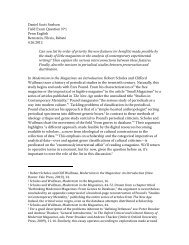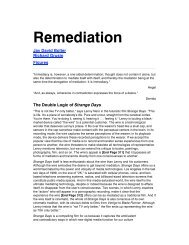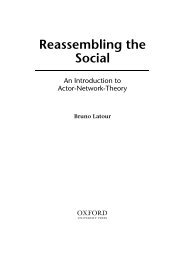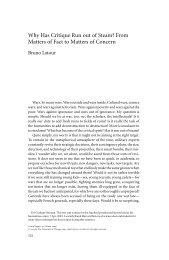The Exploit: A Theory of Networks - asounder
The Exploit: A Theory of Networks - asounder
The Exploit: A Theory of Networks - asounder
Create successful ePaper yourself
Turn your PDF publications into a flip-book with our unique Google optimized e-Paper software.
Coda 151<br />
robustness that centralized modes <strong>of</strong> organization lack. In fact, the<br />
analyses <strong>of</strong> Hardt and Negri, as well as Virno, seem to imply the identity<br />
between the formal and ideological planes <strong>of</strong> the multitude, an<br />
isomorphism between the topological and political levels.<br />
Contemporary analyses <strong>of</strong> “multitude” (such as those <strong>of</strong> Hardt and<br />
Negri, and Virno) share significant affinities with Arquilla and Ronfeldt’s<br />
analysis <strong>of</strong> “netwar.” In this intersection, political allegiances <strong>of</strong> Left and<br />
Right tend to blur into a strange, shared concern over the ability to control,<br />
produce, and regulate networks.<br />
For Arquilla and Ronfeldt, “netwar refers to an emerging mode <strong>of</strong><br />
conflict (and crime) at societal levels, short <strong>of</strong> traditional military<br />
warfare, in which the protagonists use network forms <strong>of</strong> organization<br />
and related doctrines, strategies, and technologies attuned to the information<br />
age.” 5 While they write from a perspective far to the right<br />
<strong>of</strong> Hardt and Negri or Virno, Arquilla and Ronfeldt do acknowledge<br />
that netwar has two sides to it: “We had in mind actors as diverse as<br />
transnational terrorists, criminals, and even radical activists.” 6 While<br />
they, like Hardt and Negri, discuss the 1999 anti - WTO demonstrations<br />
in Seattle, they also discuss international terrorist networks,<br />
the Zapatista movement, and pro - democracy uses <strong>of</strong> the Internet in<br />
Singapore, Vietnam, and Burma. Thus “netwar can be waged by ‘good’<br />
as well as ‘bad’ actors, and through peaceful as well as violent measures.”<br />
7 For Arquilla and Ronfeldt, the diversity <strong>of</strong> types <strong>of</strong> netwar, as<br />
well as their complexity (they outline five distinct levels at which<br />
netwar operates: technological, doctrinal, ideological, narratological,<br />
and social), makes them a unique emerging form <strong>of</strong> political action,<br />
with all the unknowns that such forms imply. For them, “netwar is an<br />
ambivalent mode <strong>of</strong> conflict.” 8 And as we discussed at the outset,<br />
the radicality <strong>of</strong> Arquilla and Ronfeldt’s analyses is to suggest that “it<br />
takes networks to fight networks”—that network modes <strong>of</strong> action<br />
require network - based responses (a suggestion that, to be sure, works<br />
against many <strong>of</strong> the U.S. military’s legacy centrist hierarchies).<br />
Despite their political differences, both the concept <strong>of</strong> the multitude and<br />
the concept <strong>of</strong> netwars share a common methodological approach: that “the









